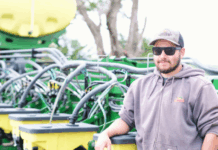From the Office of Public Affairs | http://www.news.ku.edu
Headlines
James Webb Space Telescope survey reveals fewer supermassive black holes than presumed
LAWRENCE — A University of Kansas survey of a swath of the cosmos using the James Webb Space Telescope has revealed active galactic nuclei — supermassive black holes that are rapidly increasing in size — are rarer than many astronomers had assumed previously. The findings, made with the JWST’s Mid-Infrared Instrument (MIRI), suggest our universe may be a bit more stable than was supposed.
Feloniz Lovato-Winston to become next director of KPR and Audio-Reader
LAWRENCE — An experienced leader with expertise in fundraising and community engagement will serve as the next director of Kansas Public Radio and Audio-Reader. Feloniz Lovato-Winston brings more than 13 years of experience in radio and reading services, most recently as the major gifts and corporate sponsorships coordinator for KPR. Her new role begins in September.
Trina Spencer named director of KU’s Juniper Gardens Children’s Project
LAWRENCE — Trina Spencer, who researches the promotion of academic language of young children with and without disabilities, will lead Juniper Gardens Children’s Project at the University of Kansas, one of 12 research subcenters at the KU Life Span Institute. Spencer brings an extensive record of federally funded research to Juniper Gardens, a center focused on children’s social well-being and academic achievement based in Kansas City, Kansas.
Full stories below.
————————————————————————
Contact: Brendan Lynch, KU News Service, 785-864-8855, blynch@ku.edu, @BrendanMLynch
James Webb Space Telescope survey reveals fewer supermassive black holes than presumed
LAWRENCE — A University of Kansas survey of a swath of the cosmos using the James Webb Space Telescope has revealed active galactic nuclei — supermassive black holes that are rapidly increasing in size — are rarer than many astronomers had assumed previously.
The findings, made with the JWST’s Mid-Infrared Instrument (MIRI), suggest our universe may be a bit more stable than was supposed. The work also gives insights into observations of faint galaxies, their properties and challenges in identifying AGN.
A new paper detailing the JWST research, conducted under auspices of the Cosmic Evolution Early Release Science (CEERS) program, was made available today on arXiv in advance of formal peer review publication in the Astrophysical Journal.
The work, headed by Allison Kirkpatrick, assistant professor of physics & astronomy at KU, focused on a long-studied zone of cosmos dubbed the Extended Groth Strip, located between the Ursa Major and Boötes constellations. But previous examinations of the area relied on a less powerful generation of space telescopes.
“Our observations were taken in last June and December, and we were aiming to characterize how galaxies looked during the heyday of star formation in the universe,” Kirkpatrick said. “This is a look back in time of 7 to 10 billion years in the past. We used the mid-infrared instrument on the James Webb Space Telescope to look at dust in galaxies that are existing 10 billion years in the past, and that dust can hide ongoing star formation, and it can hide growing supermassive black holes. So I carried out the first survey to search for these lurking, supermassive black holes at the centers of these galaxies.”
While every galaxy features a supermassive black hole at the middle, AGN are more spectacular upheavals actively drawing in gases and showing a luminosity absent from typical black holes.
Kirkpatrick and many fellow astrophysicists anticipated that the higher-resolution JWST survey would locate many more AGN than a previous survey, conducted with the Spitzer Space Telescope. However, even with MIRI’s boost in power and sensitivity, few additional AGN were found in the new survey.
“The results looked completely different from what I had anticipated, leading to my first major surprise,” Kirkpatrick said. “One significant revelation was the scarcity of rapidly growing supermassive black holes. This finding was prompting questions about the whereabouts of these objects. As it turns out, these black holes are likely growing at a slower pace than previously believed, which is intriguing, considering the galaxies I examined resemble our Milky Way from the past. Earlier observations using Spitzer only allowed us to study the brightest and most massive galaxies with rapidly growing supermassive black holes, making them easy to detect.”
Kirkpatrick said an important mystery in astronomy lies in understanding how typical supermassive black holes, such as those found in galaxies like the Milky Way, grow and influence their host galaxy.
“The study’s findings suggest that these black holes are not growing rapidly, absorbing limited material, and perhaps not significantly impacting their host galaxies,” she said. “This discovery opens up a whole new perspective on black-hole growth since our current understanding is largely based on the most massive black holes in the biggest galaxies, which have significant effects on their hosts, but the smaller black holes in these galaxies likely do not.”
Another surprising outcome was the lack of dust in these galaxies, said the KU astronomer.
“By using JWST, we can identify much smaller galaxies than ever before, including those the size of the Milky Way or even smaller, which was previously impossible at these redshifts (cosmic distances),” Kirkpatrick said. “Typically, the most massive galaxies have abundant dust due to their rapid star formation rates. I had assumed that lower mass galaxies would also contain substantial amounts of dust, but they did not, defying my expectations and offering another intriguing discovery.”
According to Kirkpatrick, the work changes understanding of how galaxies grow, particularly concerning the Milky Way.
“Our black hole seems quite uneventful, not displaying much activity,” she said. “One significant question regarding the Milky Way is whether it was ever active or went through an AGN phase. If most galaxies, like ours, lack detectable AGN, it could imply that our black hole was never more active in the past. Ultimately, this knowledge will help constrain and measure black hole masses, shedding light on the origins of black holes growing, which remain an unanswered question.”
Kirkpatrick recently earned significant new time on JWST to carry out a larger survey of the Extended Groth Strip field with MIRI. Her current paper included about 400 galaxies. Her upcoming survey (MEGA: MIRI EGS Galaxy and AGN survey) will include about 5,000 galaxies. The work is planned for January 2024.
-30-
————————————————————————
The official university Twitter account has changed to @UnivOfKansas.
Refollow @KUNews for KU News Service stories, discoveries and experts.
Tweets by KUnews
————————————————————————
Contact: Joe Monaco, Office of Public Affairs, 785-864-7100, jmonaco@ku.edu, @UnivOfKansas
Feloniz Lovato-Winston to become next director of KPR and Audio-Reader
LAWRENCE — An experienced leader with expertise in fundraising and community engagement will serve as the next director of Kansas Public Radio and Audio-Reader.
Feloniz Lovato-Winston has been named the next director of KPR and Audio-Reader and will begin her new role in September.
Lovato-Winston brings more than 13 years of experience in radio and reading services, most recently as the major gifts and corporate sponsorships coordinator for KPR, where she manages a portfolio of more than 300 mid-to-major donors and corporate sponsors while partnering with KPR staff to enhance the station’s connections with the community it serves. She has also served as director of development for both organizations and has been able to develop strong relationships with supporters and advocates.
“We are delighted to welcome Feloniz as the next director of KPR and Audio-Reader,” said Joe Monaco, associate vice chancellor for public affairs for the University of Kansas. “Felly’s combination of experience, talent and vision set her apart and make her a terrific fit for this role. We are excited about the future of Kansas Public Radio and Audio-Reader under her leadership.”
Lovato-Winston replaces outgoing director Dan Skinner, who is retiring after eight years as the director of KPR and Audio-Reader and 50 years in the radio industry.
“I’m incredibly honored to have been selected for this position,” Lovato-Winston said. “Kansas Public Radio and Audio-Reader provide vital access to news, information and cultural experiences. The dedication and passion of the staff and volunteers have been a source of inspiration for me over the years, and I’m excited to continue to work with such a talented group in my new role as director.”
Kansas Public Radio, a 22-time Kansas Association of Broadcasters Station of the Year, broadcasts on multiple frequencies across east, central and southeast Kansas and northwest Missouri and also operates KPR2, a news-talk station. KPR carries programs from National Public Radio – including “Morning Edition,” “All Things Considered” and “Wait…Wait…Don’t Tell Me” – as well as regional news. Listeners can also hear a diverse selection of music throughout the day, including classical during the week, jazz every evening, as well as bluegrass and the popular “Retro Cocktail Hour” every weekend. KU owns the station’s broadcasting license, granted by the Federal Communications Commission, and operates KPR as part of KU’s outreach and service mission.
The Audio-Reader Network is an audio information service for individuals who are blind, visually impaired or print disabled, serving Kansas and western Missouri. With the help of many dedicated volunteers, they provide accessible audio versions of newspapers, magazines and books on the air, over the internet, by telephone and via smart speakers, 24 hours a day. Services are free of charge to anyone who is unable to read standard printed material.
-30-
————————————————————————
Don’t miss new episodes of “When Experts Attack!,”
a KU News Service podcast hosted by Kansas Public Radio.
https://kansaspublicradio.org/when-experts-attack
————————————————————————
Contact: Jen Humphrey, Life Span Institute, 785-864-6621, jenhumphrey@ku.edu, @kulifespan
Trina Spencer named director of KU’s Juniper Gardens Children’s Project
LAWRENCE — Trina Spencer, who researches the promotion of academic language of young children with and without disabilities, has been named director of the Juniper Gardens Children’s Project at the University of Kansas, one of 12 research subcenters at the KU Life Span Institute.
Spencer brings an extensive record of federally funded research to Juniper Gardens, a center focused on children’s social well-being and academic achievement based in Kansas City, Kansas.
Her work applies aspects of behavior, language, psychology and education to the development and assessment of tools that promote early literacy, language and reading comprehension.
“Dr. Spencer is a great fit for the directorship of the Juniper Gardens center,” said John Colombo, director of the Life Span Institute. “Her science is rigorous, and it readily translates to educational and clinical practice. Her focus on partnerships and collaboration make a wonderful continuation to the history of community-engaged research at Juniper Gardens.”
Spencer’s work has evaluated the feasibility, efficacy and sustainability of interventions, including Multi-tiered Systems of Support, or MTSS, models for schools. She has led creation of tools such as a language intervention curriculum called Story Champs, a multi-tiered Spanish-English curriculum for preschoolers whose primary language at home is Spanish, and an augmented and alternative communication storytelling program in South Africa, where she was a Fulbright Scholar at the University of Pretoria. There she also developed ECHO Autism – South Africa, a virtual learning network of providers offering real-time access to autism and behavioral experts.
In addition to her role as director at Juniper Gardens and senior scientist at the Life Span Institute, Spencer will hold a faculty appointment in the KU Department of Applied Behavioral Science and a courtesy appointment with the KU Department of Speech-Language-Hearing. She earned a doctorate in disability disciplines and a master’s degree in school psychology, both from Utah State University.
-30-
————————————————————————
KU News Service
1450 Jayhawk Blvd.
Lawrence KS 66045
Phone: 785-864-3256
Fax: 785-864-3339
kunews@ku.edu
http://www.news.ku.edu
Erinn Barcomb-Peterson, director of news and media relations, ebp@ku.edu
Today’s News is a free service from the Office of Public Affairs



